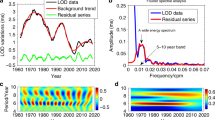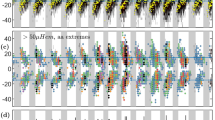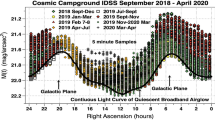Abstract
IT is known that chorus, or ‘dawn chorus’, exhibits a pronounced diurnal variation in its occurrence and that different stations show different local times for the diurnal maxima. These maxima have been shown to be a function of geomagnetic latitude by Allcock1 and independently by Pope2.
This is a preview of subscription content, access via your institution
Access options
Subscribe to this journal
Receive 51 print issues and online access
$199.00 per year
only $3.90 per issue
Buy this article
- Purchase on Springer Link
- Instant access to full article PDF
Prices may be subject to local taxes which are calculated during checkout
Similar content being viewed by others
References
Allcock, G. M., Austral. J. Phys., 10, 286 (1957).
Pope, J. H., Nature, 180, 433 (1957).
Storey, L. R. O., Ph.D. dissertation, University of Cambridge.
Maeda, Ken-Ichi, Ionospheric Research in Japan, 11, 116 (1957).
Simpson, J. A., Geeophysical Monograph No. 1 (1956).
Parkinson, W. D., and Cleary, J., Geophys. J., 1, 346 (1958).
Author information
Authors and Affiliations
Rights and permissions
About this article
Cite this article
POPE, J. Effect of Latitude on the Diurnal Maximum of ‘Dawn Chorus’. Nature 185, 87–88 (1960). https://doi.org/10.1038/185087b0
Issue Date:
DOI: https://doi.org/10.1038/185087b0
This article is cited by
Comments
By submitting a comment you agree to abide by our Terms and Community Guidelines. If you find something abusive or that does not comply with our terms or guidelines please flag it as inappropriate.



